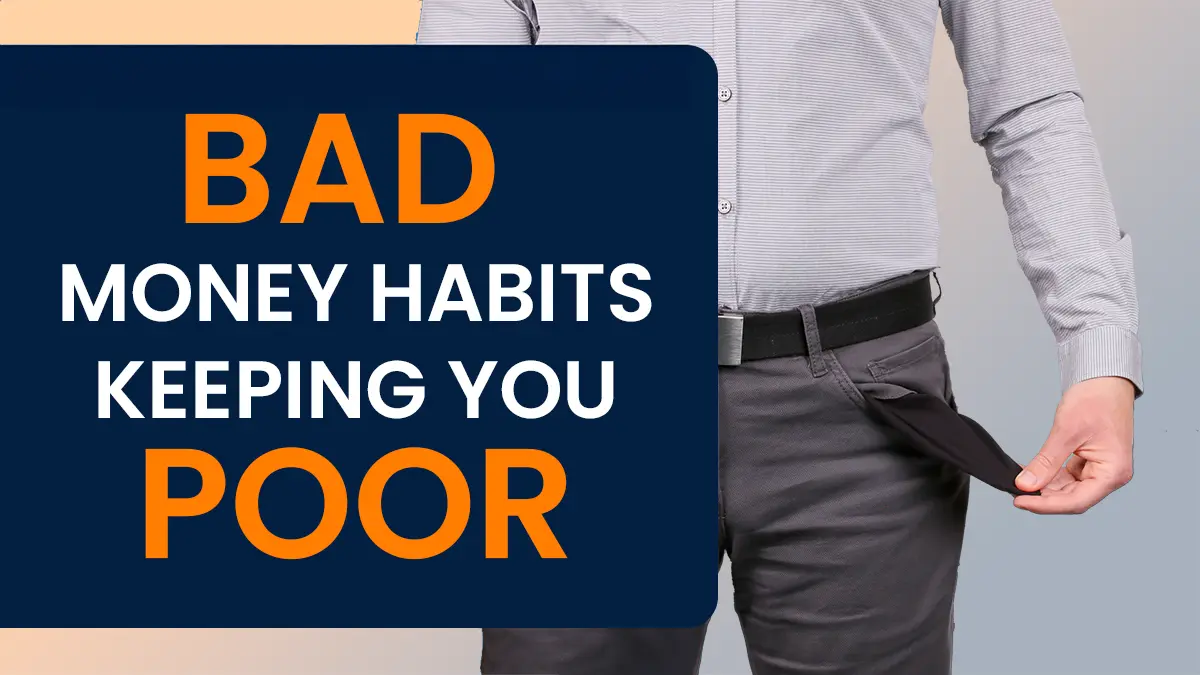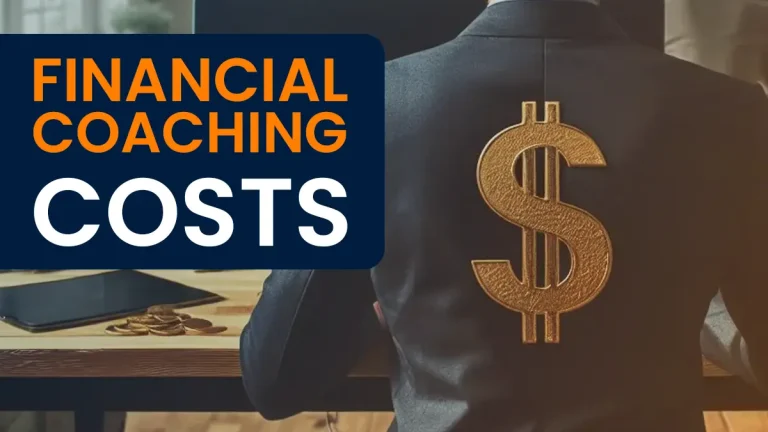It’s all too easy to get caught in cycles of making poor money decisions. These are the things you do consciously or subconsciously that drain your bank account over time.
Recognizing these traits is half the battle. Let’s examine some of the common bad money habits.
1. Paying yourself last
Rich people pay themselves first. Poor people pay themselves last.
This is a concept from the acclaimed book ‘Rich Dad Poor Dad’ by Robert Kiyosaki.
Poor people will pay their bills, pay for all their other monthly expenses, and save whatever is left over at the end of the month (if anything).
Rich people pay themselves first. They put away at least 10% of their salary into a savings or investment account.
They pay themselves every month no matter what, much like they pay a bill.
Ultimately, this is a simple mental trick you can play on yourself to save more money.
If you pay yourself first by transferring a portion of your salary to your savings account and/or investment account as soon as you are paid, you have less money in your checking account for the rest of the month.
You have given yourself a smaller budget for the month.
You psychologically feel ‘poorer’ and will naturally adjust your expenditure for the rest of the month to compensate.
Meanwhile That money is safely stored in your saving & investment accounts, and you will be less tempted to spend it.
Always pay yourself first. It’s your money that your worked hard to earn, so keep hold it.
2. Lifestyle creep
Picture the scene. You’ve just got that $500 a month raise, and life is good.
You decide to get yourself a new car with a $400 a month payment, as a reward to yourself. But that car also comes with $150 of costs including insurance, taxes, gas and maintenance.
Suddenly, you’re $50 poorer each month than before your raise, and after a few months the novelty of the new car you bought wears off. It doesn’t bring you nearly as much happiness as that extra $500 a month in your pocket would.
That is an extreme example of lifestyle creep. But lifestyle creep can be more insidious.
You start buying slightly more expensive groceries, another streaming service, a more expensive gym membership.
The little things add up until suddenly, 10 years later, your expenditure each month has doubled and you have no idea why. You’re feeling just as poor as you were a decade ago despite doubling your salary.
The things you own end up owning you.
You keep climbing the corporate ladder and working in a stressful job just to pay for the expensive car, the almost-unaffordable mortgage, and all the luxuries you have grown accustomed to.
You’ve built yourself a gilded cage. A fantastic life on paper, but you’re imprisoned by the luxuries you need to pay for each month and seem to never have any money.
It’s much harder to scale back your life once you have grown accustomed to these luxuries than it is to not indulge in them in the first place.
So tread carefully.
You absolutely should level up your life when you have success. You should reward yourself for your hard work.
But think carefully about what you truly desire. Often these material possessions are simply not worth the burden on your life.
Check out our unusual tips to save money if you have fallen into the lifestyle creep trap.
3. A New Car
The classic example of a bad money decision is buying a brand-new car on finance, as we mention above.
I myself have done it, you reading this might have done it, but don’t worry – there is a way to turn this into a good financial decision (we’ll get to that).
In most cases a car is a depreciating asset, which means that it falls in value over time.
As soon as you drive a new car off the lot, you can wave goodbye to at least 20% of its value. The value of the car will continue to fall from there.
Buying an ex-demo or used car is going to be the better option financially most of the time. Providing you do your due diligence on the car when buying it i.e., get a mechanic to check it over, it should not cost you too much in repairs over time.
Getting into a cycle of trading in your car every few years for a new car on a new finance agreement is one of the worst things you can do.
To illustrate just how bad a decision it is, let’s compare spending $500 a month on a car payment every month for your adult life, vs. investing that money in the market.
If you keep getting new cars from aged 20 to aged 60, you will spend $240,000 on car payments.
If you invested that money each month in the market instead, at an 8% average return, you would have $1,866,870.84.
That’s more than a $2,000,000 difference in net worth, just by not having a car on finance. If you don’t believe us, check out our compound interest calculator.
I’m not saying don’t buy nice things. If you love cars, go ahead.
Just understand the true opportunity cost. It’s not just the $500 a month you’re spending, it’s what that money could be when invested in the market.
If you’re reading this and have a car on finance already, here’s the good news. This can work out well, if you keep the car at the end of your loan agreement.
Simply pay off the final balance, and then for every month after that you keep the car, your car is an asset.
It will be depreciating, yes, but at a slower rate. Your finances are no longer being drained by the car payment and interest. You have true value in your car. Keep it for 10 years or as long as it is still reliable.
4. Interest dissonance
Most of us have some kind of debt. A loan, a credit card bill, a mortgage, a student loan payment.
They nearly always come with interest.
Some of them have high interest, some of them have low interest.
If it’s low interest, i.e. less than 5 or 6%, it could make more sense to invest in the market, then to try and pay it off.
I am not saying take out a 5% loan to invest in the market – that would be incredibly foolish.
But a common problem is that we focus our capital in the wrong area of our life.
The best way to explain this is with examples – see if either of these are you:
- The keen investor who puts most of their money towards their portfolio of stocks each month, despite having a car payment (or a student loan/credit card bill) with 12% interest.
- The homeowner overpaying their mortgage with only a 3% interest rate, but overpaying their mortgage makes sense to them because they’ll feel more secure once I own my own home.
The investor is blinded their desire to build wealth, that they are ignoring that they would get a better ROI (return on investment) from paying off their debt.
The homeowner is blinded by their need to own their own home and having no mortgage to worry about, that they are ignoring the fact that they would earn more money from the stock market than from paying off their mortgage early.
Be it consciously or subconsciously, many of us are ignorant about the amount of interest we are paying and earning.
We kid ourselves into believing what we are doing is right because of the psychological benefit, even if it’s not the right thing to do financially.
Now, yes, there is value in making choices that are better for you mentally. For example, it might reduce your money stress to know you have paid off your mortgage, even if you could have been wealthier by investing in the market, and that is ok.
All we’re saying is don’t let fear influence your financial decisions too much. At least ensure you are making an informed decision if you choose one that isn’t the best financially.
5. Pension blindness
For many people it is the largest part of their net worth, yet most of us go through life without giving enough thought to our 401(k) or similar pension product.
- How often do you check your retirement account?
- Do you know what your pension is invested in?
- Do you know the breakdown of stocks, bonds, and other assets?
- Do you know the fees are you being charged?
I’m willing to bet you can’t readily answer at least one of these questions, and yet your entire financial future is riding on the success of your pension.
People go to work every single day and work hard to put money into their retirement fund, and most of them know next to nothing about it.
Here are three things you can do today, right now, that could literally save you hundreds of thousands of dollars for retirement:
- Email your HR or Benefits manager today and ask them about employer matching. Many companies will match your contribution to your 401(k) or similar pension product. If you don’t know how much you, and the company are contributing, find out today. You’re leaving free money on the table.
- If you’re taking advantage of employer matching already, ask them if there is anything else you could be doing or any services you could be taking advantage of. Some companies provide consultations with financial planners free of charge, who can help you understand your pension and plan for the future. It doesn’t hurt to ask, so ask.
- Check the fund you are invested in, and its associated fees. If you don’t know, it most likely is the default fund with a medium to high risk profile depending on your age. This might not be the best fund for you, based on your stage in life, the asset classes chosen, or the fees they charge. In a few clicks you can change to something better suited for you. We have a guide for picking a low-cost passive index fund here.
6. Saving more or earning more
Many of us are too narrowly focused on either trying to save more money or trying to earn more money, when we really should be doing both at the same time.
According to the book ‘The Millionaire Next Door’, a key characteristic of millionaires is their ability to earn a lot and save a high percentage of their income.
These people are known as ‘Prodigious Accumulators of Wealth’ (PAW’s).
They drive used, reliable cars. They wear normal clothes. They spend money only on the things that truly matter to them, and they are not trying to ‘keep up with the Joneses’.
When most people imagine what it’s like to be a millionaire, they imagine spending millions. That’s the exact opposite of what it takes to become, and what it’s like to be, a millionaire.
There are many, many people out there earning over $100,000-a-year and living paycheck-to-paycheck.
They are spending like they are rich, but they will never be wealthy. They are often in tremendous amounts of debt, and will likely retire relatively poor.
Frugality is the key to being a millionaire.
Now of course, you need to earn a lot of money to be able to save a lot of money.
That’s why these prodigious accumulators of wealth also have great offense. They often run their own business or work in high-paying industries.
They earn well and save well, but it the staunch defense of the money they accumulate that is the key for them being a millionaire.
7. Paying too much tax
If you choose to invest with the wrong account type or ‘tax-wrapper’, such as by investing in a normal brokerage account, you will pay a significant amount of tax on your investment returns.
There are many ways you can invest money with tax advantages.
The more of your investment you can shield from tax, the more money you keep. Even small fractions of a percentage add up over time, sometimes to hundreds of thousands of dollars or more.
Options include:
- Investing your money pre-tax, such as in a 401(k) or similar pension product, reducing your income tax.
- Investing your money post-tax and allowing it to grow tax-free, such as with a Roth IRA in the US or Stocks and Shares ISA in the UK.
In fact, there is an optimal order to investing which can ensure you don’t pay too much tax. You can also follow our personal finance flowchart to work out what makes sense for you.
You don’t have to do it alone. If you run your own small business, an accountant can help you save tax. At certain higher levels of wealth, it can be worthwhile to engage with a financial planner.
You might balk at the initial cost, but it can pay for itself quite quickly in the tax savings you realize.
8. Failing to invest, or invest enough
Fear, procrastination & ignorance are three barriers to you becoming wealthy.
Fear
Are either of these three you?
- “The market is down right now, and we might be in for a recession, it’s not a good time to invest.”
- “The market is at an all-time high, it would be silly to buy in right now.”
Time in the market beats trying to time the market. You will never win this game of trying to time the market.
The current economic climate, whatever it may be, is absolutely irrelevant for sensible passive investing strategies.
A “bad” economic climate is a great time to buy. If the market is down, stocks are on sale. Now is the time to buy.
On the other end of the scale, just because the market is currently at an all-time high does not mean it won’t continue to grow. Don’t miss out on all that growth.
Over a long enough timeframe, the market has always returned. The market will continue to grow.
It may be bumpy, but join the ride or you will be left behind.
Procrastination
It might not be fear about the current state of the market, you may simply not have got around to setting up your investments.
The more money you invest early in your investing life, the better your prospects for becoming extremely wealthy.
That’s because of the nature of compound interest (play around with the calculator to discover its power).
The earlier you start, the longer your money has to grow.
The best time to start investing was 10 years ago. The second-best time is now.
Ignorance
If you think you should keep your money in cash because cash is safe, you are mistaken.
Investing is scary, but so is the harmful impact of inflation. If most of your money is in cash, it is slowly being eroded by inflation.
It is a bigger risk to not invest, in that respect. You are quite literally losing money in the form of buying power by keeping money in cash when it could be growing in the market.
This ignorance stems from a poor financial education system which does not prepare us for a world dominated by money.
Instead, we look at headlines around the world and see people losing money from foolish investments. We believe that the stock market is a scary place where you can lose everything.
And it can be, if you invest recklessly. But when you invest sensibly, it is far from that.
Investing is necessary if you wish to become wealthy.
You must conquer your fear, stop procrastinating, and learn the fundamentals of investing.
9. Bad Debt & Emergency Fund
Thanks to credit cards and the emergence of payday loans, it’s never been easier to fall into debt.
It can happen to anyone, and the two common reasons are:
- Shopping on a credit card when you don’t necessarily have enough in your bank account to cover the expense.
- Being caught out by an unexpected charge – a vet bill, a dental emergency, job loss, a home repair bill and so on.
Credit cards can be a useful tool if you are certain you can pay off the card in full at the end of every month.
But the credit card companies are relying on you not being able to do that.
Their interest rates are usually absurdly high, and you can easily find yourself owing hundreds or even thousands of dollars.
The way to prevent this from happening to you is with a safety net.
An emergency fund that you can use as a buffer in the face of unexpected costs. Ultimately, you need to save around 3-6 months of your income into an easy to access bank account.
You should do this before you consider most other saving and investing options.






